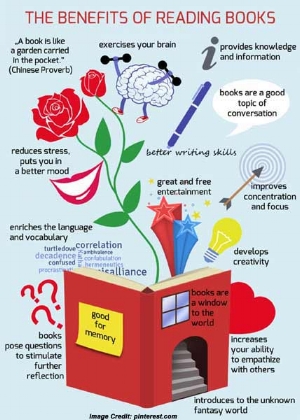By Jennifer Van Pelt
What is Mental Health and Who Can it Affect?
An infographic that says: "Fact: 1 in 5 children ages 13-18 have, or will have a serious mental illness. Source: National Alliance on Mental Illness
There are countless benefits to reading, and as May is Mental Health Awareness Month, we are focusing on the intersection of the two and are discussing how reading can be connected to an improvement in mental health. Mental health refers to a person’s condition with regard to their psychological and emotional well-being. According to MentalHealth.Gov, 1 in 5 adults in the U.S. experiences mental health issues. Mental health can affect how we think, feel, and act and can be influenced by biological factors or life experiences. Though there are many ways to improve your mental health, reading is a free method that can improve not only your mental wellness but your overall quality of life.
How Can Reading Impact Mental Health?
An infographic that explains the many different benefits of reading books, including: "reduces stress, exercises your brain, and increases your ability to empathize with others."
n a study conducted by the Reading Agency and summarized by the Independent, reading for pleasure can increase self-esteem, reduce symptoms of depression, help build better relationships with others, and reduce anxiety and stress. When immersing yourself in a good book, you can be swept away to a world that is separate from yours, thus separating yourself from the dilemmas or stresses you may have. Certain books can also help you realize you are not in alone in what you are going through, which is often times a focus for the healing process: recognizing others are going through what you are.
In a term that was coined in the early 20th century but has roots dating back to Ancient Greece, Bibliotherapy is a form of therapy that recognizes that books have the power to aid people in solving the issues they’re facing. As mentioned on GoodTherapy.org, there are various services that are offered by Bibliotherapists to discuss what you are struggling with, whether that be stress, anxiety, depression, relationships, etc. and they prescribe books that assist with these problems. There are also existing lists of books at some libraries that focus on common issues including self-esteem, adoption, substance abuse, and eating disorders, among others.
What About Mental Health Later in Life?
There have also been studies that delineate the connection between reading and mental decline that can happen later in life. In a study summarized by Psychology Today, being an avid reader throughout life and continuing into old age can reduce memory decline by more than 30%. Furthermore, for participants included in their study, those who read the most had the fewest physical signs of dementia. The Alzheimer's Research & Prevention Foundation lists brain aerobics and mind games as methods to maintain the vitality of the brain -- activities of which both heavily employ reading and writing methods and focus on continuously exercising your brain.
Overall, professionals agree that reading can have a positive impact on your mental health by building intelligence, empathy, and gaining perspective. According to this article by Jen Reviews, 40 million adults in the U.S. have a mental health condition. If that includes you or someone you love, there are numerous ways to seek help (see resources below). One small thing you can do is bring literacy to the forefront of your life by picking up a book today!
If you are struggling with mental health issues and are looking for help, visit the National Alliance on Mental Illness.
For more information about Words Alive, please click here.
Sources:
https://www.nami.org/learn-more/mental-health-by-the-numbers
https://www.mentalhealth.gov/basics/what-is-mental-health
https://www.goodtherapy.org/learn-about-therapy/types/bibliotherapy
http://alzheimersprevention.org/4-pillars-of-prevention/exercise-and-brain-aerobics/






